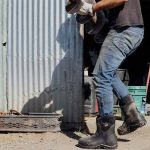The American Apparel and Footwear Association, National Retail Federation, Retail Industry Leaders Association, and The United States Fashion Industry Association responded to an announcement from the U.S. Department of Homeland Security and U.S. Customs and Border Protection (CBP) earlier today, on enforcement action regulating cotton imports from the Xinjiang Uyghur Autonomous Region (XUAR) of China to address widespread human rights abuses.
The statement read, “Our industry condemns forced labor and strives to eradicate it whether in China or elsewhere in the world. We are on the frontlines of efforts to ensure forced labor does not taint our supply chains or enter the United States. We welcome increased efforts by the U.S. Government and other entities to address the human rights abuses, including forced labor and the persecution and detention of Uyghurs and other ethnic minorities in China. We note that today’s action is focused specifically on XPCC, which is already the subject of sanctions the industry is helping to enforce.
“Clearly defined Withhold Release Orders (WROs) based on specific and actionable intelligence greatly supplement our own considerable enforcement activity, and we look forward to working with CBP to build a detailed and practical implementation strategy to make sure today’s actions are effective, enforceable, and focused on the bad actors who insist upon exploiting slave labor and do not harm trusted traders or our supply chain partners who are working tirelessly to stamp out forced labor.
“Forced labor is abhorrent; it is one component of a much larger campaign of oppression. The campaign of oppression in the XUAR region must be addressed holistically to achieve the lasting outcomes we seek to achieve.
“Today’s action reinforces the need for a unified and comprehensive approach to this human rights crisis, and we want to renew our calls for the U.S. Government to build and lead a coalition involving all stakeholders and allied countries to put pressure on China to end forced labor, and the wider campaign of repression it fuels, immediately. U.S. unilateral action can only succeed in ending these forced labor practices if it is accompanied by a “whole of world” approach.”















